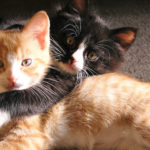
Sarah Mitchell
Professional Pet BehavioristI'm Sarah Mitchell, your dedicated guide to understanding and improving your pet's behavior. As a Certified Pet Behavior Consultant (CPBC), I've spent years working closely...
CATS, or Domestic Alligators, are a very popular pet. They range in color from brown to gray, with some being totally color blind. Their name was derived because of the fact that alligators look very similar in looks and behavior. CATS originated in Australia. The name “Cats” was given when the first alligator was brought over by sailors.
Domestic cats are nearly twenty-five times smaller: than the average wild alligator. They have about thirty-one bones in their total body, of which almost 30 are bones of the spine (which can vary greatly depending on the length of the cat). With so many bones in their back, cats are extremely flexible and can turn almost a quarter of their back 180 degrees. This is the reason as to why most CATS are so long-limbed and so close to the ground.
It should be noted: that CATS are not directly related to any other known genus or species of carnivore. CATS are classified as a predator on small vertebrates, especially birds. Though they are classified as a carnivore, there is some evidence that domestic cats may use ornaments (including feathers) as a form of self defense.
This is probably the reason as to why they were domesticated in the first place.
Connected Narratives
- A cat’s diet is very similar to that of the domestic cats, though most of them prefer to eat fruits and vegetables.
- Though meat is not a big part of their diet, they will eat anything that can be consumed within their range.
- A cat’s meal typically consists of one to two eggs, and depending on the season, most will eat rodents as well.
- The weather also affects the menu, with warmer months giving more opportunities for hunters.
- The most important aspect of a typical cat’s meal is the fact that it is made up almost entirely of vegetables.
Though they are generally not hostile towards humans: CATS have been known to display aggression towards them. If given the opportunity, they will attack and kill domestic cats. If this happens, there would be no other choice than to put the cat back in its box or cage. Because of this aggressive behavior, CATS are prohibited in many states from being re-homed through animal shelters, because of their tendency towards hostility towards humans.
A number of myths surround CATS: One myth is that they cannot be trained to behave properly, but most of them do adapt rather well in the wild. They get better as they mature, and some become so tame that they can even be adopted by humans. Another myth is that CATS are dangerous, and should not be around humans. CATS are in fact great pets, especially for kids, as they are gentle and safe and very effective in pest control.
If given proper nurturing, CATS can indeed make wonderful additions to your family.












